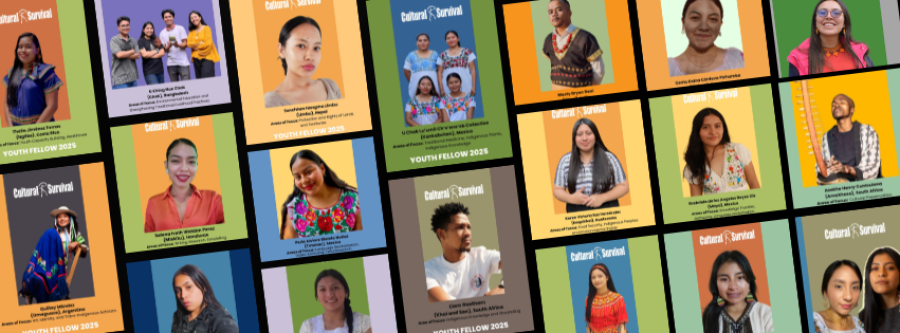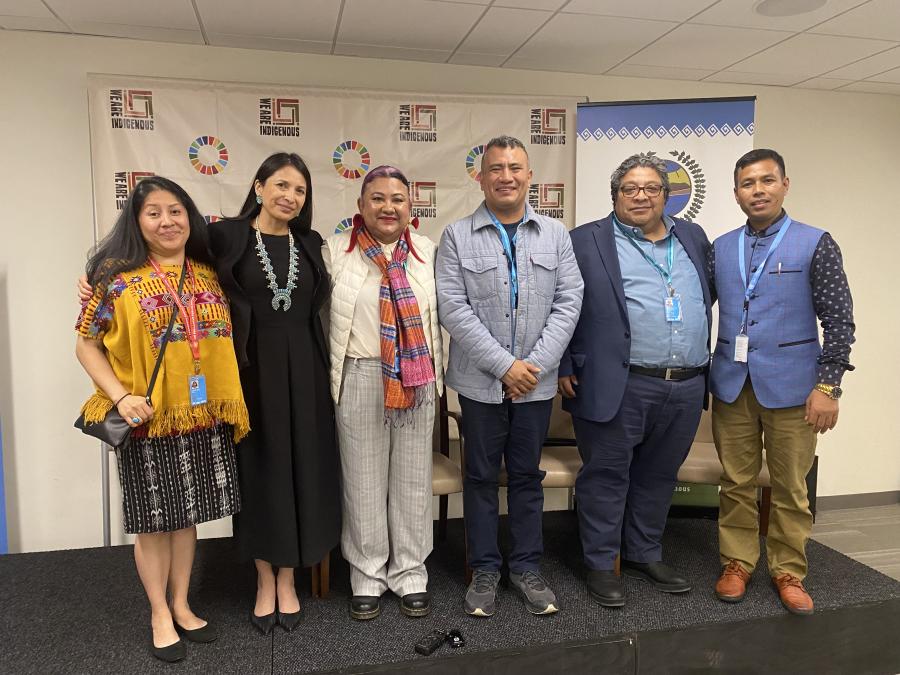Indigenous Women in Radio 2023, a three-day event organized by Cultural Survival for women from Indigenous community radio stations around the country, took place July 28-30 in Maní, Yucatán, Mexico. Twenty-eight Indigenous women between the ages of 18-59 participated in workshops on radio production and sound ambience. The event also featured a talk on community feminism, and served as an opportunity for the women to share their experiences with one another in regard to the role of women in Indigenous community radio and their fight for their rights.
Cultural Survival hosts these types of meetings as spaces to contribute to strengthening the knowledge, skills, and abilities of Indigenous women radio broadcasters with the aim of enriching their work in their respective radio stations and organizations and creating opportunities for women to participate more actively in the Indigenous community media. A special emphasis was placed on the subject of radio production, since women’s participation is often limited to cleaning the booth or broadcasting in narrowly defined parameters, without being allowed to put their skills into practice.
The meeting focused on three primary topics: women's rights; defense of territory; and revitalization of Indigenous languages. These three topics guided the workshops and the subsequent reflections and were also present in the radio productions that the participants developed as a result of the training.
The participants identified the revitalization of Indigenous languages as one of the most important issues since women and communicators have been crucial in developing language revitalization efforts. One participant commented that at her station, which is mostly run by women, they have taken on the task of documenting their mother tongues with the grandmothers of their community, with the main objective of protecting this knowledge and making radio programs to reproduce on their station to contribute to the preservation of their language.
Cultural Survival staff from our Community Media, Indigenous Rights Radio, and Capacity Building programs were the workshop presenters, along with two external workshop leaders: Griselda Sánchez (Ñuu Savi), a sound artist, journalist, and independent radio producer, and Eloísa Díez, screenwriter, documentarian and sound creator with more than 30 years of experience in the field of sound.
Members of the Organic Movement of Community Feminism of Abya Yala-Tejido, Guerrero, México were also present and gave a talk on community feminism and how it has contributed to strengthening the struggle of Indigenous women in the community of Ayutla de los Libres. The women also shared some educational materials so that participants could continue exploring and learning about community feminism, and generate ideas and reflections to be developed through future radio productions. Among these texts was “Our body is our first territory," which contains the passage: “Among the women and our communities of Abya Yala, the idea that the body is the first territory, the most immediate, and the one that belongs to us, is shared. According to this concept, the body, like the earth, is cultivated, loved, enjoyed, and defended."
The meeting was held at the U Yits Ka'an School of Ecological Agriculture, a large outdoor space coordinated by Maya families whose main areas of work are agroecology, breeding, and care of the Melipona (a type of stingless bee), the recovery of traditional medicine, and the revitalization of the Mayan language and script. In this space, the workshop participants were able to participate in activities such as meditations, active listening sessions, and recording of environmental sounds—an area in which the participants showed great interest and, above all, creativity. Incorporating ambient sounds into their productions was a novel and exciting idea for many.
Throughout the event, the participants were motivated and enthusiastic to learn new recording techniques and new possibilities for creating radio productions. There was also interest in creating a network of the Indigenous radio stations that participated in this meeting to organize as a unified front to fight for their rights as community communicators.
The sound ambience and soundscape workshops generated several reflections from the participants. They discussed how to incorporate the sounds of their communities into their productions, and also reflected on sound as an identity. One participant commented, “my community does not sound the same as other communities.” Another said that she had been “in many places where identity is clothing and language,” but that she had not thought about sound, and now sees that “it is very necessary to include.”
There were also ideas for content about sound as memory and the importance of making quality recordings of soundscapes and environmental sounds so that they become part of the memory of the following generations. The format of radio production based on soundscapes is a method of "telling a story through sounds," said Díez, one of the workshop leaders.
Another theme that was present throughout the meeting and continually taken up by the participants was community feminism. Several expressed that "it is important to build and contribute from our reality as Indigenous women," and not to rely solely on Western ideas. They added that "it is necessary to converse with them [as equals] acknowledging our contributions and knowledge."
In this space for dialogue, it was possible to reflect on the importance of caring for and defending the territory-body, which is compared to caring for Mother Earth, since both love and provide what is necessary to subsist with well being and, above all, freedom. As quoted from “Our body is our first territory,” "We know that no territory will ever be free while a sister is oppressed within it."
At the culmination of three days of workshops and training, the participants worked in teams to make radio productions in which they experimented with sound effects and environmental sound. The objective was to create short, creative productions incorporating elements of the radio language that they already knew and used while adding newly acquired skills.
Two of the themes in the pieces they produced were “feeling supported among women” and “recipes to build fellowship in rebellion.” The teams recorded the real sounds of birds, wind, fire, and water, among other elements. At the close of the workshop, each of the women who attended was given a certificate of participation. Several of the participants expressed their desire to participate in future workshops that contribute to their professional development as Indigenous women radio broadcasters.



